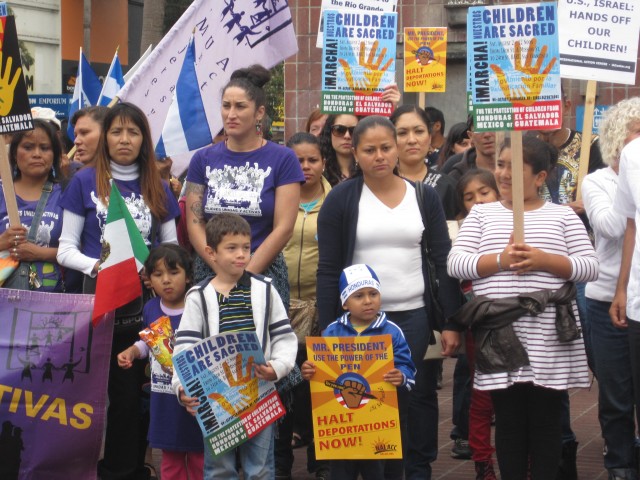“Our congregation just reacted to the situation, as a human action, a Christian action," Morataya says. "They started organizing themselves, collecting clothes and food."
Morataya has accompanied these new families to court and has given them emotional counseling. Church-goers are helping newcomers get kids registered for school, referring them to health clinics and providing translation. The congregation is also planning a dinner of pupusas and other traditional dishes to raise money for the families.
One woman, Cata, who came with her daughter, son and toddling grandson from Guatemala, says she arrived with no money. Cata didn’t want her last name used.
“Thank God, the brothers and sisters of the church, when I least expect it, they bring me rice, beans, clothes and shoes," says Cata in Spanish. "Yesterday a sister from church came and asked me if I needed dishes and she brought me a set."
The newcomers' situation hits close to home for the members of the congregation, many of whom are immigrants themselves.
“We came, too, some of us many years ago, and we went through the same situation,” says Deacon María de Jesus Martínez, who came to Oakland from El Salvador. “When we needed help, someone supported us. Now it is our time to muster up all of our strength to help the immigrant people who are coming.”
The work the congregations are doing is vital, says Emma Paulino, a community organizer who works with churches throughout Oakland.
“These families, the only people they trust, are the people in the congregations," says Paulino. "So the congregations are playing a huge role right now, as a bridge between the communities who came so traumatized, and the resources."
Congregations stepping up for Central Americans is nothing new in the Bay Area. In the 1980s, the region became a hub for the Sanctuary Movement, when churches and synagogues offered safe havens for thousands of people fleeing brutal civil wars in El Salvador and Guatemala. Many were initially denied asylum in the United States.
Today’s crisis is stirring up a lot of memories for people who went through that, including San Francisco poet Jorge Argueta, who was 18 when he made the journey north.
“I left El Salvador at the time of the revolution. I had been persecuted by the death squads,” says Argueta.
He ended up in detention in El Centro (Imperial County).
“I stayed there for three, four months,” Argueta continues. “So I know, in my own flesh, the feeling that one has in his heart, and his mind, and his spirit, when someone is saying ‘No, you are not welcome here!’ That is a horrible, horrible feeling.”
Determined to send a different message to the children arriving now, Argueta organized a day of “Flor y Canto” -- poetry and music -- in the Mission District, to collect books and toys to donate to kids detained at the border.
The larger Bay Area Latino community is wrestling with the serious question of how to get resources to support local grass-roots efforts to support the families. The Latino Community Foundation in San Francisco held a recent gathering to strategize and fundraise, setting up a fund for Latino philanthropists to donate to the cause.
Lariza Dugan-Cuadra was one of the speakers at the event. Dugan-Cuadra is director of the Central American Resource Center. She said she and her staff are working overtime to meet the needs of children and families coming to their office.
“Every time I feel tired, every time I want a break, I tell myself, ‘If this was my child, I would want somebody doing exactly what I’m doing,'" she says.
An expansive sense of what it is to be family is also palpable elsewhere in the community, including the church in Oakland.
One 18-year-old Honduran girl says Morataya and his congregation received her and her family as if they had been waiting for them, like relatives, at home.
